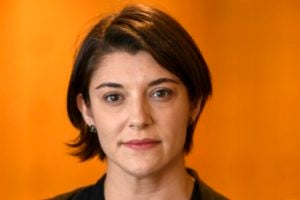To celebrate International Women’s Day on March 8th, all this week MSFS is highlighting women in our program’s community who strive to further gender equality and inclusion in their professional and personal lives. For our first piece, we spoke with two current students, Katarina O’Regan and Turkan Mukhtarova (MSFS ’19), who work to combat gender-based violence in communities around the world.


Katarina O’Regan (MSFS ’19)
Katarina O’Regan is a second-year MSFS student focusing on humanitarian emergencies, national security, and multilateral diplomacy. In addition to roles at the British Embassy in D.C., a public health NGO in Liberia, and the U.S. Embassy in Tunis, she worked at the Asian University for Women in Bangladesh, where she served as a teaching assistant and writing tutor for female undergraduates from 16 different countries. Immediately before starting MSFS, she worked on the Gender, Women, and Democracy team of the National Democratic Institute where she supported projects designed to address violence against women in politics. As a graduate student, she has continued to focus on women’s empowerment, coordinating proposals to reduce sexual and gender based violence in Ugandan refugee settlements.
How has MSFS encouraged you to work at the intersection of women and international affairs?
My classes and research as part of MSFS have provided me with an in-depth understanding of the importance of women to international development and political stability. For example, in a class on humanitarian emergencies, I wrote a comparative analysis on the role of women in peace agreements in Nepal and Liberia. I had worked in Liberia prior to graduate school and had been awed by the courage of women who helped bring an end to the civil war, so I was thrilled to have the opportunity to explore the subject academically at Georgetown. I have also learned about the role of women in development through many of the classes in the International Development concentration. Understanding the links between equal access to education, reductions in maternal mortality, and political participation have made me even more passionate about creating policies that focus on gender equality in my future career. Finally, serving as Teaching Assistant to former Secretary of State Madeleine Albright has been an honor. Secretary Albright has been an inspiration to me for years, and working closely with her has inspired me to seek leadership positions myself and to help advance the careers of other women.
Beyond MSFS, how will you work towards contributing to gender inclusivity in your professional capacity?
I hope to work in foreign policy in the context of humanitarian crises, addressing the fact that women often bear unequal burdens in fragile contexts. During graduate school, I have learned how important it is to link long-term development actors to emergency responders and how women are often uniquely situated to help their communities transition from instability. Accordingly, I intend to consider gender in all policies and programs I contribute to and implement. I am a Presidential Management Fellowship (PMF) finalist and hope to work on human security issues for the U.S. Department of State. I look forward to ensuring that American foreign policy recognizes the importance of bringing women to the table.
This year’s theme for International Women’s Day is “Balance for Better”. The theme focuses on innovative ways to advance gender-balance in areas across economic and social spheres, for example promoting gender-balanced boardrooms, gender-balanced classrooms, etc. How do you personally weigh the importance of achieving gender-balance in relation to other efforts to empower women?
Gender-balance is necessary, but not sufficient for women’s empowerment. Representation opens opportunities for younger women to participate in politics, become leaders in their industries and advocate for other policies that empower women and dismantle systematic violence and prejudice. However, as studies of countries with quota systems for representation show, gender-balance does not automatically address other obstacles to women’s empowerment, such as sexual harassment, additional structural barriers for women of color, impunity for perpetrators of sexual assault, inadequate maternity leave, and unequal burdens at home. Gender-balance should be part of a comprehensive set of policies that empower women. Equal pay wouldn’t hurt either!


Turkan Mukhtarova (MSFS ’19)
Turkan is second-year student from Azerbaijan. She has worked with the World Bank Group to promote justice engagement in Europe and Central Asia region, especially with regard to increasing access to justice for women in the context of domestic violence/gender based violence. She has conducted extensive research exploring how increasing the share of female police officers encourages the reporting of domestic violence incidents in Azerbaijan and aims to work on the issue after she leaves MSFS.
How has MSFS encouraged you to work at the intersection of women and international affairs?
Growing up in rural Azerbaijan, I saw first-hand the realities of gender challenges. I felt that in order to create lasting change for my community, I needed to challenge myself. I believe being a student in the MSFS program has given me a solid foundation for a professional career at the intersection of women and international affairs. MSFS has really been a place for me to take my understandings on woman and the role of women in international affairs to the highest level. It has exposed me to diversity of thought and students of an array of different backgrounds. Different people have provided me with the gift of different opinions on gender-focused contemporary challenges.
Beyond MSFS, how will you work towards contributing to gender inclusivity in your professional capacity?
Working to include gender inclusivity has always been a part of my academic and professional journey. From my work at the World Bank to my Oral Exam, I have always tried to maintain women’s rights and gender inclusivity in my academic and professional endeavors.
In your opinion, what are the most important ways we can empower communities to work towards ensuring gender-balance globally today?
I believe that achieving equal opportunities in leveling the playfield is a fundamental step in creating a better future for women around the world. However, I do not think simply removing barriers to female participation is enough. We have to address structural systems of marginalization which prevents women from pursuing their dreams, here and back home in Azerbaijan.
Structural inequality often creates an environment where women are not provided with equal opportunities. I think working at the community level to empower civil society leaders and working to identify and, especially, support those who face systemic challenges is extremely important.
Do you think that approaches to female empowerment have changed over time? Are there areas where we need to make more progress?
We have seen a lot of success in the West in creating opportunities for women in breaking through the glass ceiling. However, I come from a rural community where these types of global changes haven’t reached yet. There needs to be a greater effort to make sure that we are not forgetting women and leaving them behind.